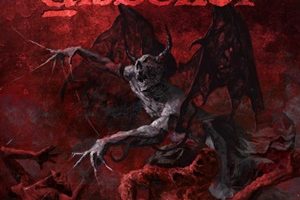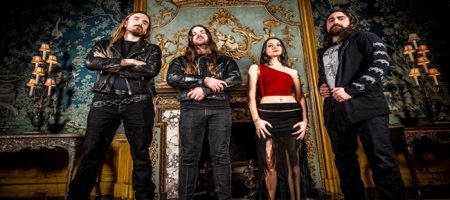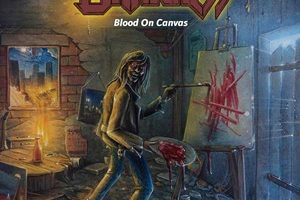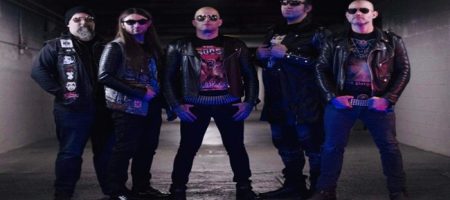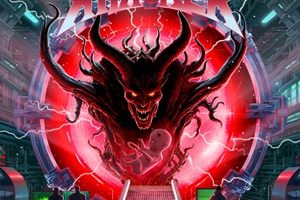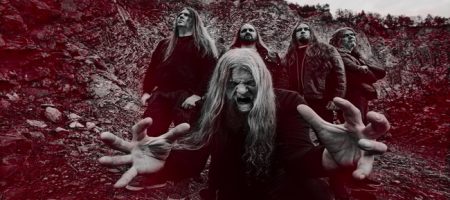Surgical Strike – Nonstop Hate
Tuesday, 13th February 2024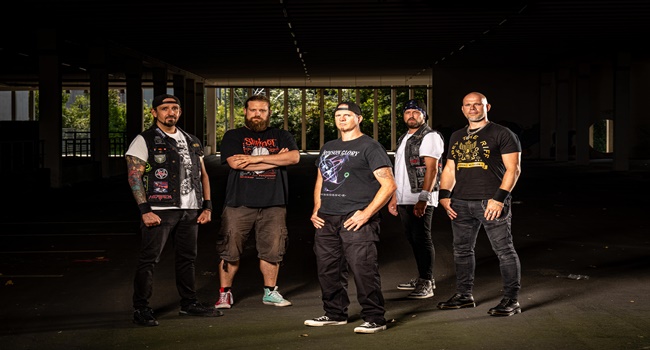
Photo: Marcel Huebner
Just as important in the thrash genre as the Bay Area, Germany has always been a solid market not just for its fervent appreciation of the movement, but it’s own domestic output. Surgical Strike may be one of those under the radar acts now aiming to reclaim themselves after an original run in the 1990’s – now releasing their second studio album in 24/7 Hate. The record contains serious melodic power/thrash chops, beyond your normal Exodus/Testament sound into aspects of Heathen, Metal Church, and Vicious Rumors on the musical front. We reached out to vocalist Jens Albert to get more of the scoop on the band’s resurrection, the work behind 24/7 Hate, how they are as a live band, thoughts on the state of thrash today, some of his favorite albums and a special Iron Maiden concert memory, as well as plans for the future.
Dead Rhetoric: What are some of your earliest memories related to music growing up in childhood? At what point did you discover heavier forms of music – as well as the desire to start performing in bands?
Jens Albert: Okay. What I can remember is during the 80s that was my childhood, I would listen to the radio. Then in the 90s I was listening to Depeche Mode, Genesis, more rock stuff. Later on, when I was 15 years old, that was the first time I started listening to heavy metal. I started listening to bands such as Iron Maiden, my first album was Seventh Son of a Seventh Son by Iron Maiden. And then I got into Queensrÿche with their release Empire, over the years the music I became interested in heavier forms like power metal and thrash metal. Bands like Vicious Rumors, Crimson Glory, Armored Saint, and all that stuff.
Dead Rhetoric: Did you pick up an instrument and learn to play before you started singing, or was that always your first love?
Albert: No. It was just dependent on the situation. When I was young, we always wanted to start a band, whether it was playing the guitar, drums. In all of these bands, none of my friends wanted to sing to be honest. I was able to write some lyrics because my English was a little bit better than the other guys in the band. That’s how I started to sing.
Dead Rhetoric: Surgical Strike originally existed in the 1990’s and has been active once again since 2014. What do you remember about the first time around for the band – and what prompted the resurrection of the group?
Albert: We started the band in 1993, that’s right. We made two demos back then. The problem was in those days we were playing gigs, but thrash metal was not very popular as you know. We had some local gigs in Hanover, and the furthest gigs were only about 15 km away. Both of our guitarists wanted to start the project again. In 2015 we came back together and wrote some new songs. We didn’t have a name for the project, and they said we could not do a reunion because if you do a reunion, it has to be with the old members from the first lineup. It was like a resurrection of this new band because I was the only one left from the old lineup.
Dead Rhetoric: Did you get the name Surgical Strike after the Queensrÿche song of the same name?
Albert: Uh… to be honest, yes. It was not me; it was one of our first guitarists on the first demo tape. It was his idea, he came along with the name, and I thought it sounded good. Especially because I was a big fan of the band.
Dead Rhetoric: The latest Surgical Strike album is 24/7 Hate. What can you tell us about the songwriting and recording sessions for this set of material – and where do you see the major differences between this record and 2020’s Part of a Sick World?
Albert: Most of the songs were written during these corona days. Normally we would have planned to release a new album about two years after Part of a Sick World. As you know, we didn’t have the chance because all of us live in different parts of Germany, so we were not able to practice together. Like you do nowadays, we were sending around ideas, demos of our songs, that was the writing process. When we had the first demos finished, we made pre-production tapes on our own. We went after three and a half years into the studio to record this stuff.
My opinion, I think 24/7 Hate sounds a bit more melodic. It has more of an epic touch to it. It’s still a thrash album and it’s a very fast album, because I think some songs are some of the fastest songs we’ve ever written. It has a deeper feeling to it than the first album.
Dead Rhetoric: Was it also a planned thing to do a sequel song to “Sorrow of War” from the previous album with “Sorrow of War II” on 24/7 Hate?
Albert: It’s cool that you are asking about this. It wasn’t planned, when we wrote the first demo for “Sorrow of War II” it has a bit of an influence from the first part. It was the oldest song that we recorded back in the day. I thought to myself, I really would like to write a song with lyrics that are similar to the first part, because it has an interesting chorus with the guitar chords. Maybe there will be a part three on the next album, too.
Dead Rhetoric: What sort of topics do you like to tackle with the lyrics for Surgical Strike? Do you pull from a mix of real-life situations, social/political injustice angles, or other influences across the media spectrum?
Albert: It’s more like things that I notice and experience these days. Thanks to all the things that have been happening during the corona days, or when we were stuck at home. A lot of problems worth talking about. Part of a Sick World was more political, compared to 24/7 Hate. 24/7 Hate has more of a personal touch to the lyrics.
Dead Rhetoric: How would you describe your style of thrash to the uninitiated? Do you believe the band has certain trademarks or specific qualities in the songwriting, approach, or attitude that have to be there to make the grade?
Albert: Yes. What is outstanding in our sound is that we have a lot of melodic, twin guitar aspects. Bands like Judas Priest, Iron Maiden, or bands like Queensrÿche. It’s very heavy still and will be heavy in the future – we don’t have a plan to change our direction. My vocals are more like thrash shouting – but the guitar work separates us a bit from a lot of the German thrash metal bands or the new wave of thrash metal.
Dead Rhetoric: I would agree. I feel you pull from a number of US power metal influences, like Vicious Rumors, Metal Church – and a little bit of Heathen as well…
Albert: Yeah, thank you. I love to hear that. These are all bands that I personally love – and we love as a band. It’s cool that you mention Heathen – I really love that band.
Dead Rhetoric: How would you describe the band’s outlook and philosophy when it comes to live performances versus what people hear on the record? What have been some of the favorite or more memorable performances to date for the group?
Albert: We always try to move; we play thrash metal so it’s not like progressive metal. The most important thing is somehow delivering the music with an aggressive amount of energy. We like to express ourselves on stage. Two years ago, in 2022, we had a lot of cool shows. We played Wacken Open Air, Dong Open Air, Metal Frenzy that were all great German metal festivals. Especially Wacken was a very cool experience for us.
Dead Rhetoric: What are your thoughts on the state of heavy metal currently? What do you enjoy most about the genre – and what changes (if any) would you like to make for the greater good of the movement?
Albert: That’s very hard to say. I hope that people are doing more to support lesser-known bands. There is a lot of good stuff coming out, especially in the thrash metal genre. People can check out more than the old stuff. We don’t know how long the older bands will still exist, and people need to check out new music. Newer bands like Warbringer, Havok, all these bands. There are some more bands here in Germany, the new wave of thrash metal like Toxicator and Eradicator.
Dead Rhetoric: Do you think it’s hard to make a breakthrough in Germany because it is one of the main meccas not just for domestic bands, but international acts?
Albert: That’s a hard question. The interest in newer bands is definitely there, and it exists, but as I’ve said there are still too many releases. Bands should pay more attention to producing videos, supporting each other by exchanging shows, something like this. That’s the most important thing to me. There are still people going to shows, during the corona days a lot of the clubs had to shut down. It is a bit harder than it was three or four years ago.
Dead Rhetoric: How do you feel about the changes in the music industry / promotional model in the current scene versus how music was promoted and developed during the 80s, 90s, and early 2000’s?
Albert: For sure, it is a bit easier to release something even if you don’t have a record label. Everybody can upload videos, songs, all this stuff. On the other side, maybe there’s a bit too much out there. There are a lot of good bands to check out, but there’s also a lot of stuff on the internet where I would say, it may be too early for the musicians to release something.
Dead Rhetoric: What sort of hobbies, passions, and interests do you have outside of music that you like to engage in when you have the free time and energy to do so?
Albert: I’m doing a lot of sports like running. I have a job as a mailman for the German post office. I like checking out new bands, going to concerts. Talk with people about music – music will always be number one for me.
Dead Rhetoric: What are the three most important metal albums in your opinion – and what’s the best concert memory you have, attending a show as a fan – plus what made this show so special to you?
Albert: First of all, Queensrÿche – Operation: Mindcrime. It’s one of my all-time favorite albums. Heathen – Victims of Deception. And another thrash album, Exodus – Fabulous Disaster. Those are the best, but I could name maybe twenty more. These are the ones that come first to my mind. If you are talking about shows – my favorite concert is Iron Maiden for the No Prayer for the Dying tour here in Hanover, supported by Anthrax. Anthrax had released Persistence of Time in those days. That was my first concert at the age of fifteen.
Dead Rhetoric: What’s on the agenda for Surgical Strike over the next year or so?
Albert: Get some more shows. We hope to get on a tour, play some festivals. We have some people asking us, and people who are booking shows. We will see. We want to play as many shows as possible for us.











